Just because it's obvious | |
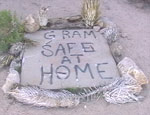
| I've said in the past that I believe we all move through life in looping paths, always coming back to touch on a common base, and making connection with previous loops as we head out anew. I was considering what the 'base' point, the absolute centre of our lives might be recently, and it struck me that it may very possibly be the very thing which I consider all great Pop to be intrinsically about, and that is, to put it very crudely, a sense of loss. And of course loss is not necessarily a negative concept. No-one embodies this sense of loss better than Gram Parsons. Like all sensible 35 year olds I've been on 'country music' loops in my life before now. I have listened to Jimmy Rogers, Merle Haggard, Johnny Cash, Hank Williams and Emmylou Harris with a snag in my throat and a bottle in my hand. The room has always been dark and I've always been feeling blue. That's the beauty of Country; everyone is broken-hearted and there's no such thing as an easy way out, or any way out at all in fact that doesn't involve whisky and/or an open road. It's the ultimate inner movie music. Naturally, I've listened to Gram Parsons many times in the past too. Gram is one of those cult phenomenons that other cult Rock Stars love so much. The story of his life is so full of self-abuse and self-destruction it's almost a parody, and if there were a movie made it would be the saddest you'd ever seen. Ben Fong-Torres tells the tale in pretty reasonable detail in his Hickory Wind biography, and Sean O'Hagan wrote a fine article for the UK Guardian newspaper a while back which is available here. Gram Parsons reminds me of Edie Sedgewick; a tragically doomed character who burned too brightly and never grew old. A character who seemed adept at making the right connections with the right people at the right times, whilst also managing to break down those connections at just the wrong moments. And you can blame privileged upbringings or a hardwired genetic tendency for self-sabotage for that as you see fit. And whilst Edie looked like an angel of heartache, Gram happened to sing like one. Of course it's wildly inaccurate to paint a picture of Gram Parsons as a one dimensional figure, but that's the nature of rock mythology. If you care to listen you'll find an upbeat Parsons laying down a blueprint Country Rock'n'Roll sound. Most notable would be 'Lazy Days', a song Parsons recorded several times down the years, cropping up as an out-take from the Byrds Sweetheart of the Rodeo and as opener on the Flying Burrito Brother's second album Burrito Deluxe. 'Lazy Days' is a hard driving tune that was later given a strange echo in the classic 'Lazy Day (Sunshine Girl)' by Krautrockers Faust. I can't listen to either one without hearing the other. |
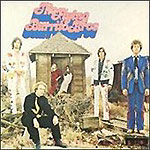
| But it's for the songs where Gram sounds like that angel of heartache that I guess most people treasure him. They treasure him for songs like the incomparable 'Hot Burrito #1' with Parsons cracking open like the San Andreas fault on lines like 'I'm your toy, I'm your old boy, but I don't want no-one but you to love me'; for the seedy love/hate relationships laid bare in 'Sin City'; for the trembling 'A Song For You' with it's lovely line 'I hope you know much more than you're believing, just so the sun won't hurt you when you cry.'; for the utterly magical duet with Emmylou Harris on 'Hearts On Fire', where two souls intertwine in a way that's obviously otherwordly; for the simple loss simply told in 'Brass Buttons' where Gram sounds for all the world like some weary character sat out on the porch, idly stroking a mementoe, singing to the bleaching sun. Or for the vacuum created by 'Love Hurts', another of his wonderful duets with Emmylou Harris; for the sad reflections of 'In My Hour of Darkness', a song that would become an epitaph of sorts, closing as it did the posthumously released Grievous Angel album. The lines 'some say he was a star, but he was just a country boy, his simple songs confess. And the music he had in him, so very few posses' were written by Gram about Clarence White, but in hindsight the duality seems eerie. Then there's the genius moment of Gram singing the Bee Gees' wonderful 'To Love Somebody', a song so sweetly barren and hopeless I want to weep every time. To hear Gram sing 'you don't know what it's like to love somebody the way I love you' is to hear your own heart opened by a silver blade of regret and to hear yourself thanking the hand that holds the knife forever. Gram Parsons is noted for saying he wanted to make 'Cosmic American Music', which is to say, perhaps, to make music which fuses the traditional American roots of Country (which itself could be the strangest music imaginable) with the psychedelic Rock at the time so beloved of youth. It's also a statement that betrays a love of the very concept of the unfathomable, immensity of the cosmos, an idea that seems to encapsulate the essence of America or at least the essence of a mythic America even by the '70s eroded and disappearing under the weight of its own Dream. Chris Bell made the same connection in his 'I Am The Cosmos' shortly after Parsons had died, and Gene Clark too was exploring the same dreams with his classic No Other album at almost the same time. Nowhere is the cosmos of America more aptly envisioned than in the desert. |
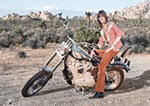
| It's easy to see why people are drawn to Joshua Tree. Not to the town, but to the desert wilderness, with it's alien landscape of towering boulders and profusion of unique trees that reach towards the heavens. The religious travellers of the past saw the trees as pointing the way to the promised land and named them accordingly, but it would be no less strange to suggest that the uplifted branches are as beacons for spaceships visiting from afar. I'm sure that Parsons, Keith Richards and others, stoned and spaced would have thought as much as they communed in the dead of night atop the mountains. It really is a strangely beautiful and compelling place. It is stranger still to discover the shrine to Gram Parsons out by Cap Rock in the Joshua Tree wilderness. And regardless of whether Phil Kafmann and Michael Martin carried the coffin this far off the road for their cremation, this little shrine seems as good a place as any to remember Gram Parsons. Not for the raggedy self-destructive life he led, but for the songs he wrote, and more importantly, the sound of his voice. Throughout his drug addled haze of 1971 and '72, Gram Parsons told all who would listen that he would be making an album produced by Keith Richards for the Stone's new label. It was an event that would never take place. Many would suggest it's something of a blessing that an explicit, recorded Richards/Parsons collaboration never happened. Until last week I would have counted myself among them. Listening to the recently released 'lost' John Phillips 'masterpiece' Pay, Pack and Follow (Eagle Records) which was produced in 1971 by Richards and Mick Jagger (and featuring contributions from Ronnie Wood and Mick Taylor) I'd have to change my mind. |
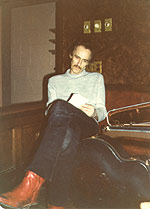
| Phillips, responsible with his groups The Journeymen and most famously The Mamas and The Papas for some of the finest Pop songs ever recorded (don't argue with me here, just go out and listen to 'California Dreamin'', 'Go Where You Wanna Go', 'Monday Monday', 'Straight Shooter' - with it's 'Last Train To Clarksville riff, 'Trip, Stumble and Fall' and the self-portrait of 'Creeque Alley' - the last two joint compositions with his second wife, Michelle, and sing your praises from the rooftops) made a record in Pay, Pack and Follow that is even more a blueprint for groups like the Jayhawks and Uncle Tupelo than the recognised Country Rock classics such as Parsons with his International Submarine Band's Safe At Home or the Flying Burrito Brothers' The Gilded palace Of Sin debut. Naturally, as is the way of such things, it's inevitably the whole melting pot of the influences at work that make Pay, Pack and Follow such a triumph, that allow it to sound fresh and magnificent even thirty years after the fact. It's the collision between Phillips' indigenous understanding of his musical heritage and the English interpretation of the Blues and American Country and Folk (the ironies and twists are great here, when you consider that many US folk tunes are themselves twisted takes on imported ancient English and Scottish folk songs) that Richards, Jagger, Wood and Taylor bring to the mix that really make this a great record. There is a natural empathy and tension in place that leads songs into avenues which, one suspects, neither Phillips nor the Stones would have thought to explore if they had been left to their own devices. There are of course resonant echoes of the Stones in the record ('She's Just 14' could be an out-take from Let It Bleed), making it clear once more that those delinquents were as commercially responsible for moulding the lasting feel of Country Rock as anyone (check out the early Uncle Tupelo, and especially 'If That's Alright' on their Still Feel Gone album for proof). Best of all are tracks like 'Wilderness of Love' and 'Sunset Boulevard' which I swear you would mistake for the Jayhawks of twenty five years later if you weren't told otherwise. In 'Creeque Alley' Phillips makes mention of playing in New York coffee shops, and of John Sebastian passing the hat, something which reminds me that it would be difficult to over estimate the importance of the folk revival of the late '50s and early '60s. There's Dylan of course, atop it all, surveying all with an eagle's eye, making connections with pretty much everything around him... also check out The Byrds early incarnation as folkies The Jet Set and then their magnificent plangent (some might say definitive) takes on Dylan with the incandescent 'Mr Tambourine Man', 'All I Really Want To Do', 'Chimes Of Freedom', 'Lay Down Your Weary Tune' ... check out Gram Parsons early forays with the Shilos, whose Paul Surratt had been a regular attendee at shows by John Phillips' early band The Journeymen. The Shilos were a band that could have so nearly made it, amazingly passing up a chance of an audition for the Ed Sullivan show in 1964, and missing out on a date at mythic New York venue The Bitter End in the same year because they were still in high school and too young to sign a contract. And didn't Felt record a song called 'The Bitter End' on their Pictorial Jackson Review album; a record filled with underground NYC references? Check out future Mamas and Papas members Denny Doherty and Mama Cass with their folk rock Mugwumps (dig out their 'I'll Remember Tonight' and 'I Don't Wanna Know' on the recent comprehensive Mamas and Papas collection Creeque Alley), a band that also featured Zal Yanovsky and John Sebastian... and of course check out Yanovsky and Sebastian's group the Lovin' Spoonful. |
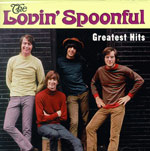
| I have to thank Kevin for introducing me to the joys of the Lovin' Spoonful. In his Hungry Beat fanzine Kevin made inspirational and informed connections that I would never in a million years have been able to make at the time. I would have dismissed the Lovin' Spoonful as music for dads. If you love the magical possibilities of life, you have to love the Lovin' Spoonful. It's easy to listen to their records now and simply fall into some strange nostalgic reverie for a time you never even experienced (but that you somehow feel you have, thanks to the marvels of media) but that really would be to miss the point, because whilst the Lovin' Spoonful are easy to package as a soundtrack to an era, they also made records that are timeless evocations of universal emotions and uplifting positive methods of living. You want some examples? How about 'Do You Believe In Magic', which could be such a corny cliché if it wasn't so magnificently RIGHT. It's still the song that takes me higher than any other, the song that makes me shiver whenever I hear it, the more so if it's been a while... like hearing it in the Who Shot Andy Warhol movie after I'd been spending a long time listening only to electronic 'dance' music, and being stopped dead in my tracks, feeling like this simple song blew the whole world apart, cut to the essence... I had tears in my eyes in the cinema darkness. Isn't it great when something like a SONG can make that happen? Quite simply 'Do You Believe In Magic' reminds me why I love music, why I love life. Two other Spoonful songs come close to fulfilling the same task. 'Jug Band Music' is a great 'joke' tune that extols the wonders of, well, jug band music for curing all sorts of ailments, whilst 'Nashville Cats' is a great reminder of that moment of discovery; the point at which you hear something that connects, that makes you realise that THIS is the noise that makes your life make sense. For Sebastian it's being 13 and hearing the sounds of those early Sun records from Nashville. You of course can translate it to whatever you want, because what's so vital is that the song captures the spirit of such discovery so aptly. There's 'Didn't Want to Have To Do It', which is a great example of the Spoonful' going downbeat, getting sad and mournful but of course without getting depressing and self-pitying. There's 'Darling Be Home Soon', an epic that touches those oft-visited themes of great Pop that are Love, Loss and Distance with an aching beauty that sweeps to victory on swelling strings and horns. Or 'She Is Still A Mystery', a glorious paean to growing older and still not being able to understand the process of love (and knowing that continuing the search is part of the key). And 'Younger Generation', which is the only song I can listen to about the approach of fatherhood, and which in fact is a beautiful song which ends with the poignant 'can it be that you can't live up to your dreams'. Which proves you don't need to be schmaltzy to provoke tears. |
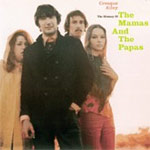
| Then of course there's 'Summer In The City', the song that Warhol remembers in the Popism book as playing all the time in the summer of 1966 in the Factory, a summer when it seemed like the streets of New York were deserted due to the mass exodus of youth westwards. 'Summer In The City' is a triumphant blast of Pop Noise, featuring the sound of pneumatic road drills and guitars that sound like fire engines. Fittingly, Fire Engines would later use guitars that sounded like Lovin' Spoonful on steroids, ripped to shreds by those very drills, whilst fellow Scots Orange Juice would use the sounds of 'Summer In The City' as a blueprint for their finest Pop Blasts, although naturally they would tear the blueprint to shreds in the process. Of course there's so much more below the surface to explore, and the icons of Gram Parsons, John Phillips and John Sebastian may seem obvious to you, but so what. There's no point ignoring beauty just because it's obvious. © Alistair Fitchett 2001 |